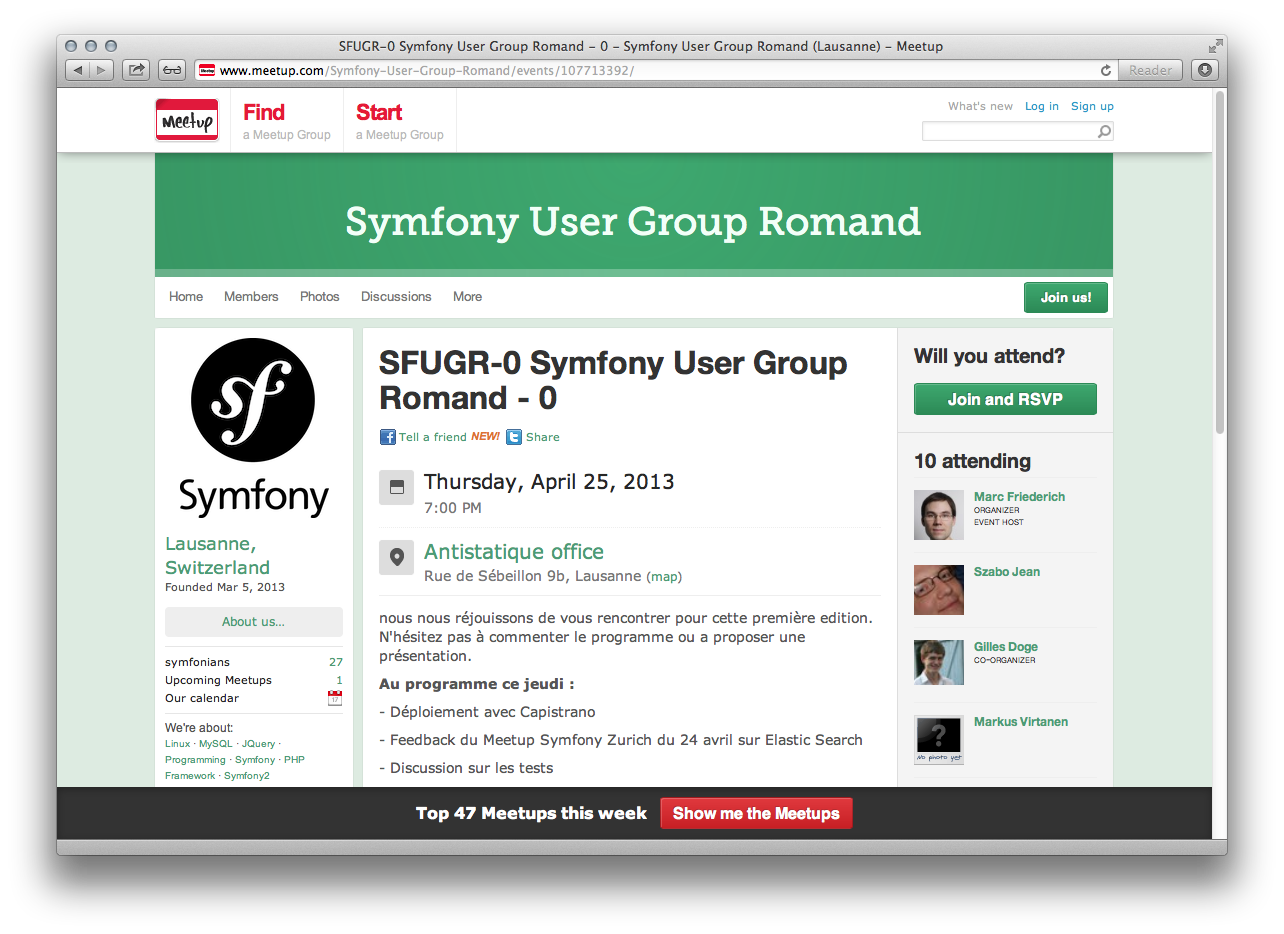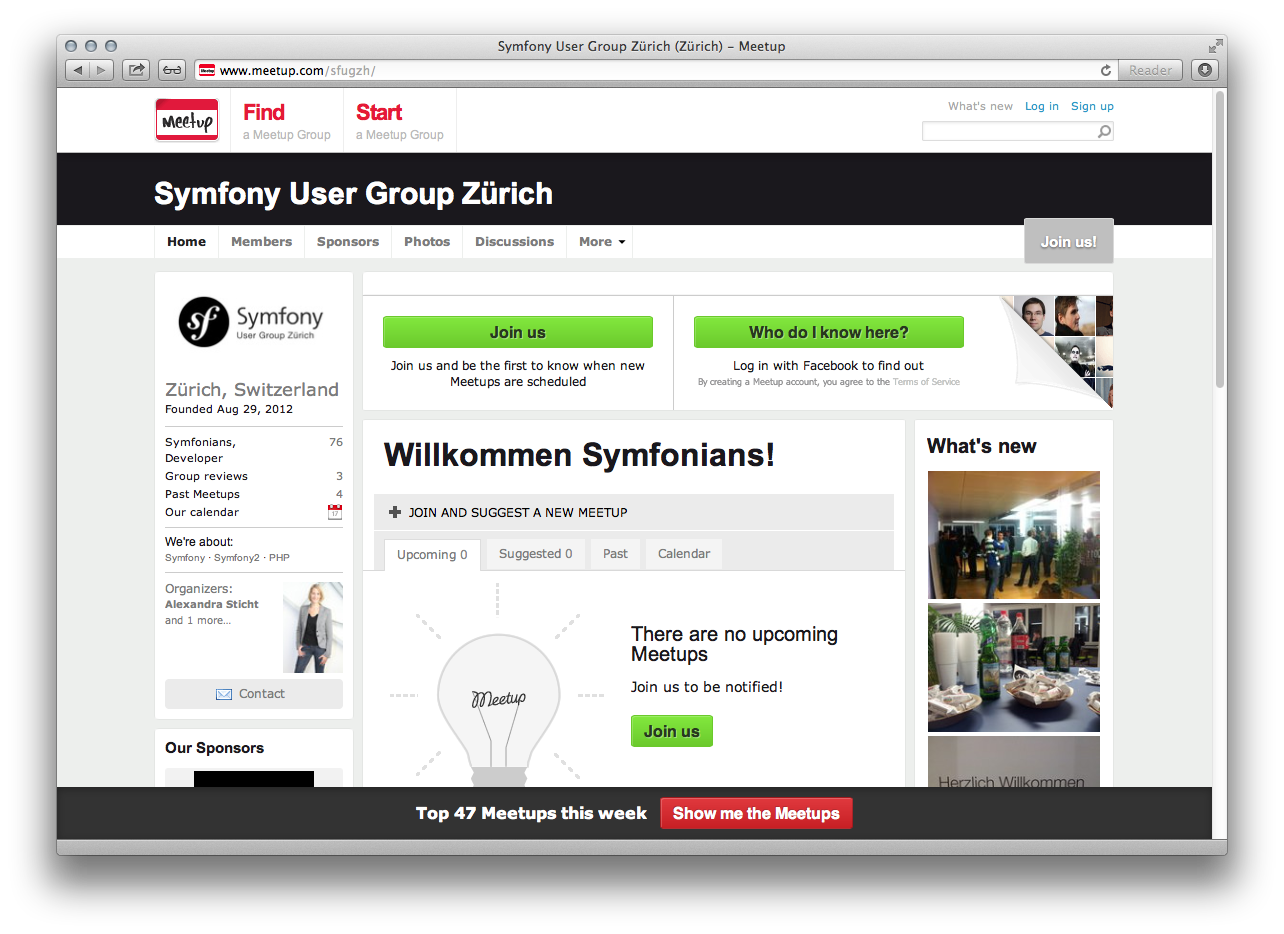SFUGR 0
Symfony User Group Romandie
Today

About the group
Symfony enthousiasts meeting in Romandie once a month for light talks about the framework eco-system.
Suggestions ...
- Format
- Location
- Frequency
- Kind of talks
- Hackathon
- Barbecue ?
Every last Thusday of the month ?
Capifony
Deployement made easy
Capistrano for symfony projects
$ cap deploy
Capistrano
- Deployment framework for web applications
- Ruby On Rails applications
- PHP applications
- Written in Ruby
Features
- Automatic deployement
- Rollback
- Execute command (local/remote)
- Multi-stage (with extension)
Requirement
- Locally
- Ruby and GEM installed
- VCS (Git, Subversion, Mercurial)
- On the server
- SSH
- Right to execute binaries (git, cp, ln)
- VCS (Git, Subversion, Mercurial)
Deployement strategy

Nice to have
# ~/.ssh/config
host lsnn
hostname lsnn.ch
user mfh
protocol 2
ForwardAgent yes
Remote file structure
.
|-- current -> ./releases/20130311184017
|-- releases
| |-- 20130301152536
| |-- 20130311180450
| `-- 20130311184017
`-- shared
|-- app
| |-- config
| `-- parameters.yml
|-- app
| |-- logs
| `-- production.log
`-- web
`-- uploads
Capifony Demo
Setup your Symfony project
$ cd my/symfony/project
$ capifony .
[add] writing './Capfile'
[add] writing './app/config/deploy.rb'
[done] symfony 2 project capifonied!
$ edit app/config/deploy.rb
./Capfile
# ./capfile
load 'deploy' if respond_to?(:namespace) # cap2 differentiator
require 'capifony_symfony2'
load 'app/config/deploy'
./app/config/deploy.rb
set :application, "mysite"
set :domain, "mysite.ch"
set :deploy_to, "/srv/www/mysite.ch/"
set :app_path, "app"
set :user, "sshuser"
set :use_sudo, false
set :repository, "git@github.com:username/repository.git"
set :scm, :git
./app/config/deploy.rb next
# directories that will be shared between all deployments
set :shared_children, ["app/logs", "web/uploads", "data"]
# share our database configuration
set :shared_files, ["app/config/parameters.yml"]
set :model_manager, "doctrine"
role :web, domain # Your HTTP server, Apache/etc
role :app, domain, :primary => true
set :keep_releases, 3
./app/config/deploy.rb next
set :use_composer, true
set :update_assets_version, false
set :dump_assetic_assets, true
set :model_manager, "doctrine" # Or: `propel`
set :app_config_file, "parameters.yml"
Tasks
$ cap -T
cap database:dump:local # Dumps local database
cap database:dump:remote # Dumps remote database
cap database:move:to_local # Dumps remote database, download...
cap database:move:to_remote # Dumps local database, loads it ...
cap deploy # Deploys your project.
cap deploy:check # Test deployment dependencies.
...
Setup
$ cap deploy:setup
Setup
$ cap deploy
Hook
# app/config/deploy.rb
after "deploy", "deploy:cleanup"
before "deploy:migrations", "database:dump:remote"
Rollback
$ cap deploy:rollback
Useful tasks
# If you need to deploy and run your migrations you can call:
$ cap deploy:migrations
# To run your test suite on the production server, just invoke:
$ cap deploy:testall
# You can invoke tasks/commands by calling:
$ cap symfony
# If you want to see all available tasks, you can run:
$ cap -vT
Ressources
Feedback from Symfony User Group Zurich

Elastic Search with PHP
- Slides : http://fr.slideshare.net/liip/elastic-searchingwithphp-zurich
- Elastica
- FOSElasticaBundle